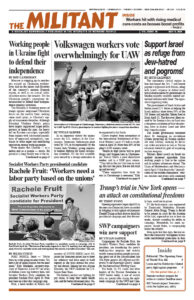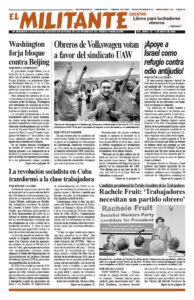Increasing numbers of working people are finding themselves unable to cover the exorbitant costs of health care for their family. This is because under capitalism medical care is treated like every other industry, a way to generate profit, not to provide care for the millions who need it, particularly for older workers. This goes for hospital, insurance, pharmaceutical and assisted-living facility bosses and more.
Drug shortages in the U.S. reached a record high in the first quarter of this year. Among the hundreds of medicines in scarce supply are the diabetes drug Ozempic, chemotherapy medications and meperidine hydrochloride injections, essential in alleviating pain during surgery. Many of these drugs are generics, where bosses have been shutting factories and cutting production in those still open because they’re not making enough profit today.
“I just find it amazing that you can’t find this stuff and nobody seems to be doing anything about it,” Stan Brady, 68, told the Wall Street Journal. He hasn’t been able to get the diabetes drug Mounjaro to control his blood-sugar levels. Alternative drugs his doctor provided haven’t worked.
The 850,000 older adults residing in assisted-living facilities across the country face penny-pinching boss cutbacks in staffing levels, meaning less care. Brookdale Senior Living, the leading operator of senior housing with 652 facilities nationwide, uses an algorithm-based system to make staff cuts wherever possible and to assign time limits for those remaining to see to the needs of each patient.
When things take longer, residents are charged special fees on top of the thousands of dollars they pay for the luxury of staying in these facilities each month. At one residential center, Brookdale charged each resident with special cognitive or psychological needs an extra $468 to $703 a month for an average of 14 minutes of additional care per day, the Washington Post reported April 1.
There are no federal laws regulating the 31,000 assisted-living facilities in the U.S., and Medicare doesn’t cover costs there. Only 13 states require staffing minimums.
Those who signed up for Medicaid to help cover the costs of assisted-living facilities or for care at a family home soon learn that this “benefit” also comes at a price. Most states limit those eligible for Medicaid to people who have a maximum of $2,000 in assets. If you own a home, the boss or the government can seize it after you die. Your family is left with nothing.
Since 2021 some 17,000 families in Illinois alone have had their homes repossessed by the state through so-called Medicaid recovery.
At the same time, the federal and state governments have been slashing Medicaid coverage, hitting lower-paid workers the hardest. In March 2023 the Joseph Biden administration ended the pandemic-era policy that barred states from disenrolling people. Since then, more than 20 million people have been kicked off Medicaid.
The drugstore chains are another part of the health industry slashing staffing and pushing speedup to boost profits. Workers there are pushing back. At the end of last year, pharmacy workers carried out a three-day walkout demanding more hiring and better working conditions.
The International Association of Machinists has set up a special Pharmacy Guild to organize workers who fill prescriptions. In the last three weeks workers at CVS Omnicare Las Vegas — an operation that handles prescriptions for area nursing homes — and two CVS pharmacies in Rhode Island filed for Guild representation.
Hidden fees boost profits
Hidden fees are an increasingly popular way hospitals and insurance companies reap extra profits today. Hospital bosses add billions of dollars in “facility fees” to medical bills for routine care in outpatient centers and clinics they own.
Tim Ebel visited an ear, nose and throat specialist at an Avon, Ohio, clinic last October and was billed $348 for the visit. Then he got a second bill for $645 more. It was from the hospital that owns the Avon clinic, billing for use of the office where he met with the doctor.
Secret fees like this boost your medical bills by hundreds of dollars for receiving widely used and standard medical treatment, including colonoscopies, mammograms and heart screen tests.
Another scheme used by insurance companies is to charge exorbitant fees when you have to seek treatment from doctors who are not part of your insurance plan’s network of providers.
“Weeks after undergoing heart surgery, Gail Lawson found herself back in an operating room. Her incision wasn’t healing, and an infection was spreading,” the New York Times reported April 7 in an article titled “Insurers Reap Hidden Fees by Slashing Payments. You May Get the Bill.”
But the doctor who performed the second surgery on Lawson wasn’t covered by her insurance plan, so she was hit with a bill for more than $100,000. “I’m thinking to myself, ‘But this is why I had insurance,’” she told the Times. “They take out, what, $300 or $400 a month? Well, why aren’t you people paying these bills?”
Many of health insurance conglomerates work with a “data analytics” firm called MultiPlan to boost their fees by cutting payments to out-of-network doctors or heaping extra bills on the patients. Over the past few years, one of the nation’s largest insurers, UnitedHealthcare, has reaped $1 billion in fees annually from this scam.


